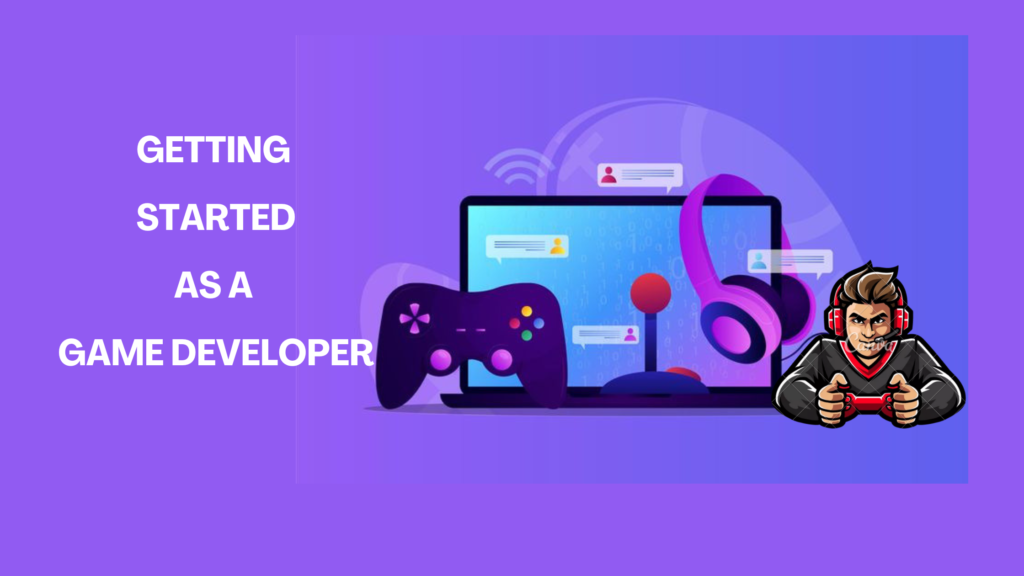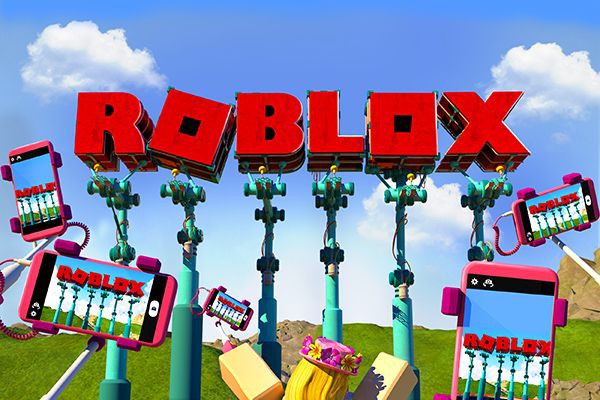Introduction
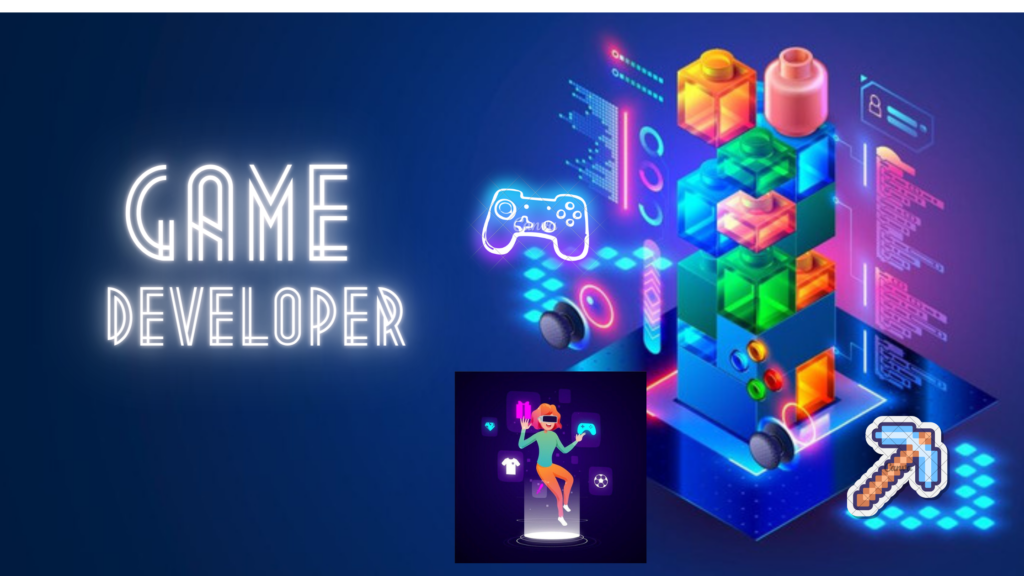
The world of Game Development careers has become increasingly appealing to the younger generations, particularly tech-savvy, such as Gen Z and Gen Alpha. This comprehensive guide aims to provide a detailed industry overview, including game developer jobs and remote opportunities.
To help individuals kick-start their journey into this exciting realm. In the field of the rapidly evolving technological landscape, the allure of a career in game development has never been greater. This guide will provide readers with a comprehensive understanding of the industry’s various aspects and equip them with the necessary tools to explore game development careers.
- Understanding Game Development Roles:
- Educational Requirements to get Game Developer work.
- Top 5 Universities for Game Development Degrees in India
- Top 5 Universities for Game Development Degrees in Abroad:
- 3. Exploring Video Game Developer Jobs
- 4. The Rise of Remote Game Developer Jobs
- Know about Unity Game Development job
- Game Developer Work Environment
- Takeaways:
- Frequently Asked Questions (FAQs)
Understanding Game Development Roles:
a. Games Programmer
Games programmer are the key contributors to game development as they are responsible for writing the code that brings games to life. They work on various aspects of game development, including game mechanics, artificial intelligence, and networking. Aspiring programmers should familiarize themselves with programming languages such as C++, Python, and Java. The choice of the best language for you depends on your level of experience, the type of game you want to create, the platforms you want to target, and the features you want to implement. Therefore, you should consider these factors carefully before making your decision.
- Performance needs: For high-performance gaming applications, C++ is considered optimal. In contrast, C# or Java are recommended for projects with lower performance requirements.
- Ease of learning: Python or C# are more suited for beginners, while C++ is best for those with more advanced programming skills.
- Game engine compatibility: Regarding game engine compatibility, C# is recommended for Unity, while C++ is best suited for Unreal Engine.
- Target platforms: For Android, Java is the recommended language, while for iOS, Swift is the optimal choice.
- Specific game features: Cross-platform development can be achieved through the use of C#. Finally, Python is the recommended language for AI or scripting functions, while C++ is the best fit for low-level hardware control.
b. Game Designer Roles
Game designers are responsible for creating the overall experience of a game, from gameplay to levels and mechanics. They focus on engaging and entertaining players, and they must have a good understanding of game design principles and be proficient in using design tools like Unity or Unreal Engine.
External link: https://gamedevacademy.org/game-design-principles-tutorial/
c. Game Artist Positions
Game artists bring a game’s visuals to life by creating characters, environments, and assets. They use tools such as Photoshop, Blender, or ZBrush to produce stunning visuals that captivate players. Strong artistic skills and a creative mindset are essential for success in this role.
External link: https://www.devtodev.com/education/articles/en/197/10-best-game-design-youtube-channels
d. Game Tester Careers
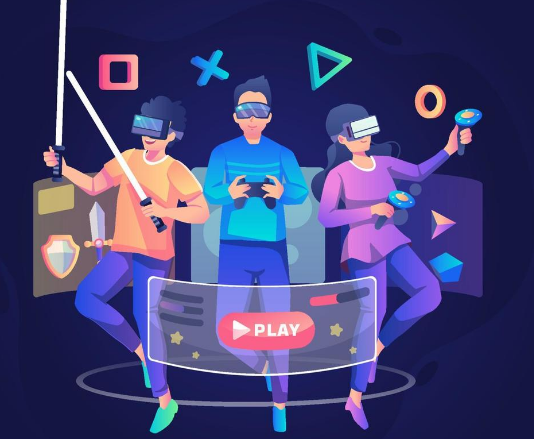
Game testers play a critical role in ensuring games are bug-free and polished, thereby contributing to the quality assurance of a game. They test gameplay rigorously, identify any issues, and provide feedback. Attention to detail and a passion for gaming are essential qualities for game testers.
Freelance platforms like Upwork, Fiverr, Freelancer, Test gorilla, and others offer game testing opportunities and game developer work. Create a robust portfolio and showcase your skills to get these jobs.
e. Sound and Music in Games
Audio professionals enhance the gaming experience by creating immersive soundscapes and music. They collaborate with other developers to synchronize audio with gameplay, and knowledge of audio software and a keen ear for detail are vital for success in this role
f. Game Animator Positions

Game animators bring characters and objects to life by creating realistic movements and interactions using software like Maya or Blender. They must have a strong understanding of anatomy and movement to produce captivating animations. A strong understanding of anatomy and movement is crucial for animators.
Educational Requirements to get Game Developer work.
a. Educational Roadmap:
Once you finish your 12th grade, you have the option to pursue a diploma or certificate course in game development and design. Alternatively, you can opt for a Bachelor of Science in game design and development, which typically takes around 3 to 4 years to complete.
To get into an undergraduate (UG) program, aspiring students need to clear entrance exams conducted by different institutes, including IIT. UG courses are available in both engineering and science streams, with the former taking 4 years and the latter taking 3 years.
To pursue a game development course at the postgraduate (PG) level, one must first qualify for the PG level entrance test. Students can also opt for specializations in game development or related fields.
Various undergraduate and postgraduate courses are available for those who want to become a game developer. Some top courses and degrees include B.Sc Multimedia Animation and Graphics, which is a 3-year degree course that focuses on graphic designing, creative animation making, and game development topics. Students study computer graphics, storyboarding, computer languages, gaming technology, and more.
Top 5 Universities for Game Development Degrees in India
India is home to several prominent institutions that offer comprehensive programs in game design and development. These programs are designed to provide students with the necessary skills and knowledge to pursue careers in this exciting field. Here’s an overview of some of the best institutions in India that offer game design and development programs:
1. National Institute of Design (NID) Bangalore: NID is a highly respected institution that offers a Master of Design (M.Des) program in Game Design. This program places a significant emphasis on user-centered design principles and follows a structured curriculum, which equips students with the skills they need to succeed in the industry.
2. Indian Institute of Technology Bombay (IIT Bombay): IIT Bombay is another top institution that offers a Master of Science (M.Sc) program in Media Arts and Sciences with a specialization in Game Design. The program is designed to provide students with a strong foundation in game design, as well as other creative aspects that are relevant to the field.
3. Manipal Academy of Higher Education (MAHE) Manipal: MAHE offers a highly-regarded Bachelor of Technology (B.Tech) program in Game Technology. This program is well-established and focuses on programming and game engine development, which are critical skills for anyone looking to pursue a career in game design and development.
4. Zeenat Qureshi College (ZQC) Mumbai: ZQC is an excellent institution that offers a comprehensive Bachelor of Arts (BA) program in Game Design and Development. This program covers various aspects of game creation, including 3D modeling, animation, and programming, making it an excellent choice for anyone looking to enter this exciting field.
5. Arena Animation across India: Arena Animation is a well-known institution that has campuses across India. They offer diplomas and degrees in game design, animation, and visual effects, providing students with a broad range of skills and knowledge that are relevant to the industry.
Overall, these institutions are excellent choices for anyone looking to pursue a career in game design and development. Their programs are designed to provide students with the skills they need to succeed in this exciting and rapidly growing field.
Top 5 Universities for Game Development Degrees in Abroad:
The Interactive Media & Games Division (IMGD) at the School of Cinematic Arts of the University of Southern California (USC) is a renowned institution worldwide for its exceptional programs in game design and development. The division offers a range of programs, including a Bachelor of Arts (B.A.) in Interactive Entertainment, a Master of Fine Arts (MFA) in Interactive Media, and a Ph.D. in Media Arts and practice. Its alumni have gone on to work at top game development companies such as EA, Blizzard, and Riot Games, among others.
Digipen Institute of Technology is a private university with campuses in Redmond, Washington, USA, Singapore, and Bilbao, Spain, that offers Bachelor of Science (B.S) degrees with specializations in game development, computer science, and digital art and animation. The university has partnerships with top game development companies, including Nintendo, Microsoft, and Valve, among others. Digipen hosts an annual career fair that connects students with industry professionals.
The Art, Technology, and Culture (ATC) program at the University of California Berkeley (UC Berkeley) in the USA provides a Master of Fine Arts (MFA) degree in Electronic Arts, with a focus on experimental and artistic game design. The program combines traditional fine art practices with digital technologies to produce innovative works of art. The ATC program has a strong reputation for producing graduates who become leaders in the field of digital art and game development.
The National University of Singapore’s (NUS) School of Design and Engineering presents a Master of Science (M.Sc) degree in Games Technology, with a focus on game development, game design, and game research. The program emphasizes aspects such as game design theory, game programming, game engine development, and game analytics, among others. The school has a state-of-the-art game development studio, where students can work on projects and collaborate with industry partners.
Tokyo University of Technology (TUAT) in Japan, through its Department of Media Arts and Sciences, offers a Master of Engineering (M.Eng) degree in Game Design and Development, with a strong emphasis on computer graphics and virtual reality. The program covers topics such as game programming, computer graphics, human-computer interaction, and virtual reality, among others. The curriculum is designed to prepare students for careers in the game development industry, as well as in related fields such as virtual reality and augmented reality.
Additional Factors to consider
- When selecting a program it’s important to consider its focus, such, as game design, programming or art. Find one that aligns with your interests and long term career goals.
- Additionally it’s beneficial to look for programs that have experienced faculty members and a track record of alumni in the game industry.
- Don’t forget to take into account factors, like the programs location, tuition fees and living expenses when making your decision.
- Lastly but importantly carefully review the programs admission requirements and deadlines before applying.
Stages of Game Development
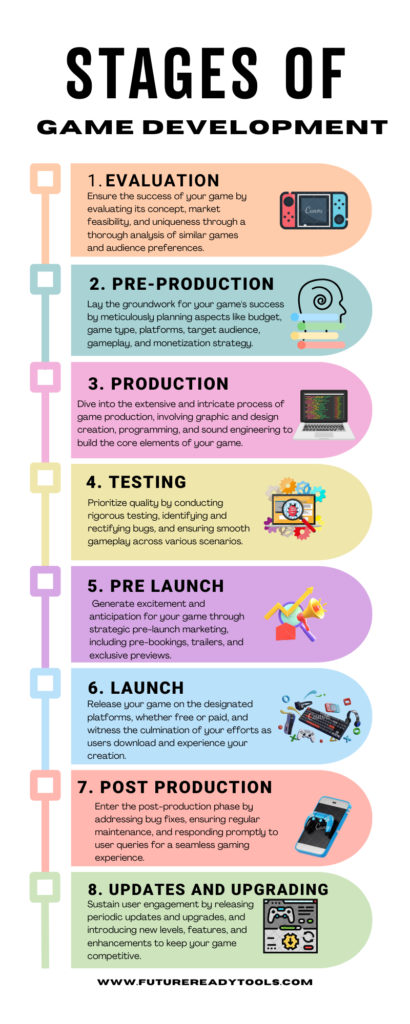
b. Online Learning Platforms
Online learning platforms and courses are a flexible and convenient alternative for those interested in game development careers. Websites like Coursera, Udacity, and Khan Academy offer a wide range of courses and resources for aspiring game developers to learn at their own pace and on their own terms. These platforms provide a great opportunity to gain knowledge and skills in game development without the constraints of traditional education paths.
External links:
https://www.coursera.org/specializations/game-design
https://www.udacity.com/course/2d-game-development-with-libgdx–ud405
c. Game Development Bootcamps
Bootcamps are a great option for individuals who are seeking a more immersive and hands-on learning experience in the field of game development and seeking video game developer jobs.
These intensive, short-term training programs are designed to quickly impart practical skills and knowledge to students, helping them gain a foothold in the industry.
Bootcamps are often offered by private institutions and can vary in length and focus, from a few weeks to several months. They can be an excellent option for those who want to learn game development skills in a structured and supportive environment.
External link: https://builtin.com/media-gaming/gaming-development-courses-bootcamps
d. Self-Directed Learning
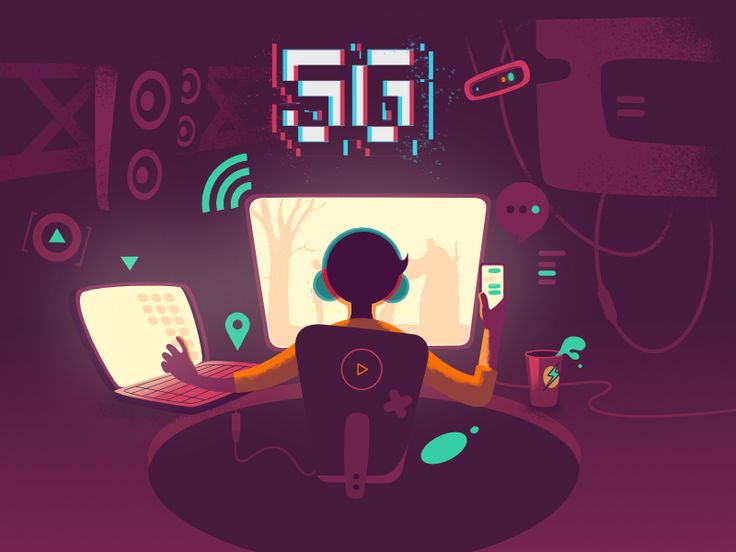
Self-directed learning is an excellent option for those who prefer to explore game development independently. With the vast array of resources available, including online tutorials, forums, and open-source projects, individuals can acquire skills organically. Building a robust portfolio through personal projects is a key aspect of this path, which can help showcase your skills and catch the attention of potential employers.
e. Game Jams and Hackathons
Game jams and hackathons are fast-paced events that bring together gaming developer, games programmer, designers, and enthusiasts to collaborate on creating games within a short timeframe of 24 hours to a few days.
Participants learn to prioritize tasks, work under pressure, and make quick decisions while showcasing their creativity and teamwork. These events also allow developers to experiment with new technologies and tools, explore different game genres, and receive valuable feedback.
Overall, game jams and hackathons provide a great opportunity to gain hands-on experience and network with other game developers in a supportive environment.
External Link: Explore upcoming game jams and hackathons https://inworld.ai/blog/game-jam-calendar-best-upcoming-game-jams
F. Build a Strong Portfolio
Irrespective of the chosen learning approach, it is of paramount importance to construct a robust portfolio that showcases one’s skills, projects, and capabilities to potential employers.
To demonstrate versatility and expertise in diverse aspects of game development, it is recommended to incorporate a vast spectrum of projects. The portfolio should serve as a reflection of one’s competence and proficiency in the field of game development, and as such, it should be crafted with utmost care and meticulousness.
3. Exploring Video Game Developer Jobs
The field of game development offers numerous opportunities for individuals looking to establish themselves in the industry. To that end, there are several techniques that aspiring game developers can employ to achieve their career goals.
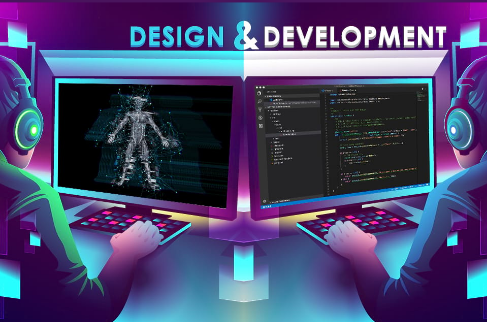
a. Opportunities in Major Game Studios:
Major game studios such as Electronic Arts, Ubisoft, and Blizzard Entertainment represent prime opportunities for aspiring game developers. These larger studios produce blockbuster titles and offer a structured environment for career advancement. Prospective candidates should monitor their career pages for available job openings.
b.Thriving in Indie Game Development:
Indie game development offers a chance for creative innovation and freedom. Aspiring game developers can join smaller, independent studios or pursue independent projects to establish themselves in the industry. Platforms like Steam and itch.io provide an avenue for indie developers to showcase their work.
c.Navigating Game Development Job Boards:
Game development job boards like Gamasutra, Indeed, and Glassdoor are specifically tailored to individuals seeking roles in game development. Candidates should regularly check these platforms for the most up-to-date job listings, internships, and freelance opportunities across various aspects of game development.
Career job opportunities https://www.linkedin.com/jobs/game-developer-jobs/
d. Networking at Gaming Conferences :
Attending gaming conferences and events is an excellent way to network with industry professionals. Conferences like GDC (Game Developers Conference) and PAX (Penny Arcade Expo) provide a platform for individuals to connect, learn, and explore potential job openings.
e. Keeping an Eye on Industry Trends :
Staying informed about industry trends is critical for aspiring game developers. Candidates should follow industry news, blogs, and social media accounts to stay up-to-date on the latest technologies, tools, and emerging job opportunities within the dynamic field of game development.
To learn more about other careers check out this article https://futurereadytools.com/category/careers/
External Link :https://www.forbes.com/sites/bernardmarr/2023/09/29/game-on-the-top-10-video-game-trends-in-2024/
f. Utilizing Professional Networks :
Platforms like LinkedIn provide a professional space for individuals to connect with fellow game developers, recruiters, and industry professionals. Candidates should create a compelling profile, join relevant groups, and actively participate in discussions to expand their professional network.
By employing these strategies, aspiring game developers can effectively navigate the game development industry and achieve success in their career pursuits.
4. The Rise of Remote Game Developer Jobs
a. Embracing the Remote Work Revolution:
The gaming industry has fully embraced the remote work trend, creating exciting possibilities for game developers worldwide. Remote game developer jobs enable collaboration with global teams, offering flexibility and diverse working environments.
b. Remote Opportunities with Major Studios:
Major game studios have adapted to remote work and are now offering remote positions for game developers. Take advantage of global opportunities by checking the career pages of studios such as Electronic Arts, Ubisoft, and others for remote game developer job openings.
c. Freelancing in Game Development:
Freelancing allows individuals to choose projects, set their own schedules, and work from anywhere. Platforms like Upwork and Freelancer host numerous game development gigs, ranging from programming to design and testing.
d. Remote Game Developer Tools and Tech:
Remote game developers utilize various tools and technologies to collaborate seamlessly. Stay connected with team members by exploring tools such as Slack, Trello, and video conferencing platforms, ensuring smooth communication and project coordination.
e.Challenges and Solutions of Remote Game Development:
While remote work offers flexibility, it also presents challenges. Adopt effective communication strategies and utilize project management tools to streamline workflows, addressing common issues like communication barriers and time zone differences.
f. Tips for Success in Remote Game Development:
To thrive in a remote game development role, cultivate discipline, set clear boundaries, and establish a dedicated workspace. Enhance your game development experience by networking with other remote professionals and attending virtual events.
Know about Unity Game Development job
Game development is a complex and dynamic field, and Unity game developers hold a critical role in creating captivating and interactive digital experiences. They are experts in utilizing the Unity game engine to design and develop games for a variety of platforms, including PCs, consoles, and mobile devices, and they play a crucial role in bringing creative visions to life.
Unity game developers possess a deep understanding of programming languages, particularly C#, and are highly skilled in implementing game mechanics, graphics, and user interfaces. They work collaboratively with other professionals, including artists, designers, and animators, to ensure a seamless integration of elements that collectively contribute to a truly immersive and engaging gameplay experience.
Given Unity’s versatility and popularity in the industry, these professionals are at the forefront of shaping the future of gaming, and their technical expertise and creativity are essential in delivering exceptional gaming experiences to players around the world.
Game Developer Work Environment
Understanding the Industry’s Culture and Processes The gaming industry is a rapidly evolving and expanding field that presents unique challenges and opportunities for game developers. A thorough understanding of the culture and processes of game development work is essential for success in this dynamic and fast-paced industry. This article outlines key aspects of game development work that every aspiring game developer should know.
Collaborative Studio Culture:
The game developer work environment is characterized by a collaborative and dynamic studio culture. Professionals often work in open-plan offices to foster constant communication and idea exchange. This environment emphasizes teamwork, encouraging the seamless integration of various elements to ensure a cohesive final product. Effective communication and interpersonal skills are highly valued in this industry.
Fast-paced and Innovative Atmosphere:
Game development thrives in a fast-paced and innovative atmosphere. Developers work on tight schedules to meet project deadlines, and the constant need for innovation keeps the industry on the cutting edge of technology. This atmosphere fuels creativity and pushes developers to explore new ideas. As such, staying up-to-date with the latest trends and technologies is crucial in this industry.
Project Timelines and Milestones:
Game developers operate within specific project timelines and milestones. These timelines dictate the development process, ensuring that games progress through various stages efficiently. Developers work towards achieving milestones, which could include completing specific features, optimizing performance, or reaching a playable demo. Strong project management skills are essential in this industry.
Dynamic Nature of Game Development Work:
The dynamic nature of game development work means that developers face evolving challenges and opportunities throughout the development cycle. Adaptability and problem-solving skills are crucial in addressing unexpected issues, whether related to coding, design, or project management. Being able to think on one’s feet and being open to change is highly valued in this industry.
Creative and Innovative Processes :
Creativity is at the heart of game development work. Developers engage in innovative processes to conceptualize and implement unique game features, characters, and storylines. The freedom to experiment and push creative boundaries is a hallmark of the game development work environment. As such, a strong creative vision and the ability to think outside the box are essential in this industry.
Balancing Work-Life in Game Development :
While the game development industry is known for its passionate professionals, maintaining a healthy work-life balance is vital. Game developers often work long hours, but fostering a balance ensures sustained creativity and prevents burnout. Studios are increasingly recognizing the importance of employee well-being and offering flexible work arrangements, wellness programs, and other support systems to help employees maintain a healthy work-life balance.
Takeaways:
Game development offers diverse career paths for creative and technically skilled individuals. Success in this field requires a passion for gaming, a commitment to continuous learning, and staying up-to-date with the latest trends and technologies. Professionals must remain curious, adaptable, and immersed in the dynamic world of gaming to thrive in this constantly evolving industry.
Frequently Asked Questions (FAQs)
- What is game development? Game development is the process of designing, creating, and programming video games. It involves various roles, including game designers, artists, programmers, and testers, working together to bring a game concept to life.
- What qualifications do I need for a career in game development? Most game development jobs require a bachelor’s degree in a related field, such as computer science, game design, or computer graphics. However, practical experience and a strong portfolio can sometimes be equally important.
- What skills are essential for a game developer? Key skills for game developers include programming languages (e.g., C++, C#, Python), 3D modeling, animation, storytelling, problem-solving, teamwork, and creativity.
- What are the different job roles in game development? Game development includes various roles like game designer, programmer, artist, animator, game tester, producer, and sound designer, among others. The specific roles vary by studio and project.
- How do I start a career in game development? To start a career in game development, consider getting a relevant degree, building a portfolio of game projects, networking with industry professionals, and applying for internships or entry-level positions in game studios.
- What is the average salary for game developers? Salaries in game development vary based on location, experience, and job role. On average, game developers can earn anywhere from $50,000 to $120,000 or more per year.
- Which programming languages are commonly used in game development? Common programming languages in game development include C++, C#, Python, and JavaScript. The choice of language often depends on the platform and game engine being used.
- What are the best game development companies to work for? Some of the top game development companies to work for include Electronic Arts (EA), Ubisoft, Blizzard Entertainment, Naughty Dog, and Valve Corporation, among others. However, the best company for you may vary based on your interests and goals.
- What are the major game development engines and tools? Popular game engines and tools include Unity, Unreal Engine, Godot, and GameMaker Studio. These platforms provide tools for designing, coding, and testing games.
- Is game development a stable career choice? Game development can be a stable career choice, but it’s important to keep in mind that the industry can be competitive and project-based. Job stability often depends on your skills, experience, and the financial health of the studio or company you work for.

